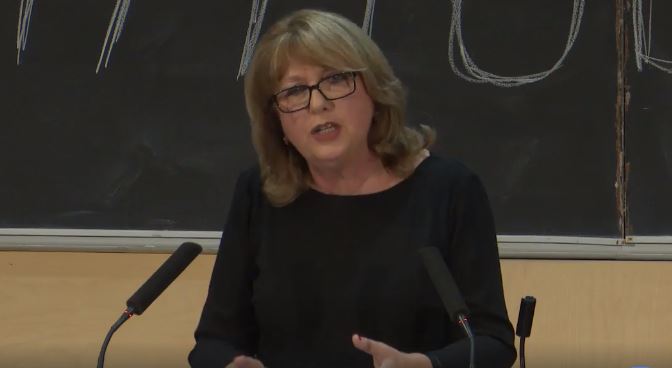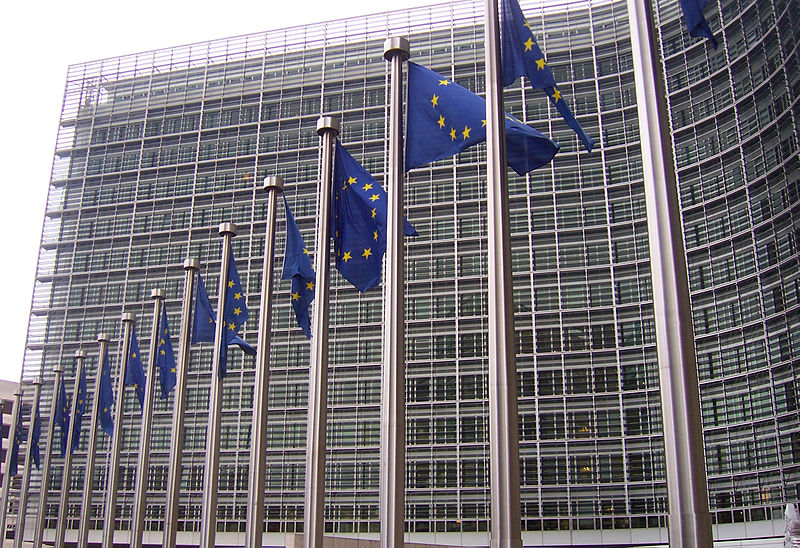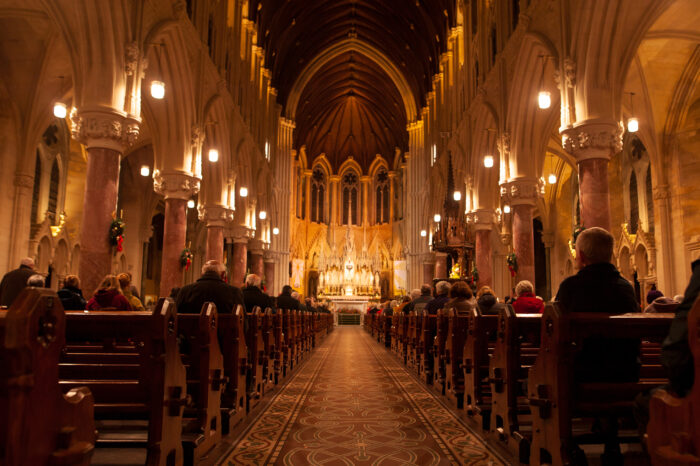
Former president, Mary McAleese, has criticised aspects of infant baptism and the educational requirements attached it under Church law.
He said those parents who seek to have their children baptised want to offer their child “a way of looking at the world which will support them in negotiating the deluge of alternative, often poisonous worldviews that kill too many of our young people”.
“We have all heard the assertion that infant baptism is a form of infant conscription and a breach of fundamental human rights,” but, he added, in a liberal society, parents make significant decisions about the lifestyle and education of their child, and “they should certainly not be prevented from or mocked for making a decision to live a faith-based value system with their children”.
He concluded: “I am grateful to my parents that I was baptised into a way of life, long before I could make a personal decision”.

The divorce rate in Europe has more than doubled since 1965.
Figures from Eurostat show in 2017, there were 2.0 divorces per 1,000 persons in the EU, more than double the crude divorce rate (0.8 divorces per 1 000 persons) recorded in 1965.
The crude divorce rate term means the ratio of the number of divorces in a population to the average population in a year. In 2018, among EU Member States, the lowest crude rates were registered in Malta (0.7 divorces per 1 000 persons) and Ireland (0.7, 2017 data), Slovenia (1.1), Bulgaria, Croatia and Italy (all three 1.5).
By contrast, the highest crude divorce rates were recorded in Latvia and Lithuania (both 3.1 divorces per 1 000 persons), followed by Denmark (2.6) and Sweden (2.5).
In Ireland, many people get legal separation without getting divorces so the divorce rate is neither a true measure of marital breakdown, nor rightly comparable with the divorce rate in other countries.

The European Commission has announced that it will reappoint the Special Envoy for the promotion of freedom of religion or belief outside the EU. The term of the Envoy lapsed some weeks ago but, following mixed communications on the topic, Vice-President Margaritis Schinas has now confirmed the reappointment.
The mandate of the Special Envoy includes visits to countries with some of the most violent religious persecution in the world.
There has been robust support for the continuation of the mandate voiced by the European Parliament Intergroup on Freedom of Religion or Belief and Religious Tolerance, national special envoys, scholars, and civil society.
Adina Portaru, Legal Counsel for ADF International in Brussels welcomed the announcement, saying the EU has “done the right thing in showing renewed commitment to this fundamental human right”.
“We urge the European Commission to strengthen the position of the Special Envoy and build on the important work already achieved. For the mandate to be most effective it should be multi-annual and with a possibility of renewal. With the support of permanent staff and sufficient resources, the Special Envoy should act as a guardian of the EU Guidelines on the promotion of freedom of religion or belief. The victims on the ground are in dire need for a decisive response from the EU. With its Special Envoy, the EU can lead in the international response, and that leadership is needed now more than ever,” she added.

The US Supreme Court ruled yesterday that an exception to government employment laws for religious ministers also applies to teachers in religious schools.
“The religious education and formation of students is the very reason for the existence of most private religious schools, and therefore the selection and supervision of the teachers upon whom the schools rely to do this work lie at the core of their mission,” wrote Justice Samuel Alito for the majority in a 7-2 decision.
When the Supreme Court heard oral arguments in the combined case in May, lawyers for the schools argued that “for hours on end over the course of a week,” teachers in Catholic schools were the “primary agents” by which the faith was taught to students.
The decision about who qualifies as a minister could directly impact future cases in which teachers might be dismissed for failing to adhere to Church teachings on same-sex marriage or transgender issues, both of which have been subjects of controversy in recent months.
Alito wrote that there must be “a recognition that educating young people in their faith, inculcating its teachings, and training them to live their faith are responsibilities that lie at the very core of the mission of a private religious school.”
The court concluded that “when a school with a religious mission entrusts a teacher with the responsibility of educating and forming students in the faith, judicial intervention into disputes between the school and the teacher threatens the school’s independence in a way that the First Amendment does not allow.”

In a victory for religious freedom and the order of the Little Sisters of the Poor, the US Supreme Court ruled 7-2 yesterday in favour of a Trump administration exemption to an Obama-era mandate obliging employers to provide for contraceptive and abortifacient coverage for employees through their health care plans.
“For over 150 years, the Little Sisters have engaged in faithful service and sacrifice, motivated by a religious calling to surrender all for the sake of their brother,” wrote Justice Clarence Thomas for the majority.
“But for the past seven years, they—like many other religious objectors who have participated in the litigation and rulemakings leading up to today’s decision— have had to fight for the ability to continue in their noble work without violating their sincerely held religious beliefs.”
The Court’s majority ruled against procedural objections brought by the states of Pennsylvania and California. The Court, however, left the door open for further litigation against the Sisters on other grounds, a fact that Justices Alito and Gorsuch lamented as, they said, the losing states “are all but certain to pursue their argument that the current rule is flawed on yet another ground, namely, that it is arbitrary and capricious and thus violates the APA.”

Plans to make it far easier for children under 16 to legally change their gender are “not a good idea”, according to Psychotherapist and Author, Stella O’Malley.
She was responding to the new Minister for Children, Roderic O’Gorman, who said children should be able to do so once a GP signs off on it and their parents consent, rather than requiring the recommendation of a medical expert.
Speaking to Shane Coleman on Newstalk Breakfast, O’Malley said neuroscience has shown that brain development doesn’t finish until 25 years of age and for this reason children are not allowed make significant life-altering decisions. They are not allowed drink, get married, get tattoos or even vote, so why should gender-identity be any different, she asked.
She also pointed out that people effectively cannot legally change back to their original sex if they regret their transition.
While she encourages teenagers to identify with a group she questioned why such choices should then be copper fastened in law.
She said children suffering with gender dysphoria need to be helped by people with a real serious concern about them rather than political parties looking to win ‘woke points’ because it seems popular.
While supportive of adults’ choices, she had two very specific objections to children medically transitioning: it leads to infertility and impairs their sexual function. Some children even chose to change their gender as a means of fleeing from same-sex attraction.
She finished by noting that the area is hugely controversial with a judicial review having been initiated in the UK recently at the behest of a child who regretted her transition, but not before she had done irreparable harm to her body.

Uighur exiles from China urged the International Criminal Court on Monday to investigate Beijing for genocide and crimes against humanity, the first-ever attempt to use international law to hold China’s ruling Communist Party accountable for its draconian crackdown on the Muslim minority.
The policies of Xi Jinping, the Communist Party leader, have put Muslim minorities in China’s western region of Xinjiang under a pervasive net of surveillance, detention and social re-engineering. As many as one million ethnic Uighurs and members of other Muslim minorities have been held in internment camps in the region, drawing growing global condemnation.
The authorities are also pursuing an expansive and troubling campaign to drastically reduce the birthrate among minority groups in Xinjiang using forced sterilisation and abortions, according to an investigation by The Associated Press and Adrian Zenz, a German researcher.
Rodney Dixon, a British lawyer leading the case said the complaint against Beijing included evidence of forced deportations and extraterritorial arrests by Chinese agents, gathered from witnesses and victims, reports from the United Nations and organizations such as Amnesty International and exile groups.
“The prosecutor needs to investigate genocide,” Mr. Dixon said. “If you capture people, and you have a campaign to suppress them and you sterilize them, it is a campaign which intends to dilute and destroy their identity as a group.”

The new Children’s Minister Roderic O’Gorman says children under 16 should be able to change their gender with simply the consent of their parents or guardians and of a GP.
The Programme for Government had made a commitment to “Commence research to examine arrangements for children under 16” who may want to change gender. It also promised laws to make it easier for 16 and 17-year-olds to legally change their sex.
Mr O’Gorman is ready to go further and said a review group had carried out work on the Gender Recognition Act.
“They brought forward proposals for children under 16. Right now, if they want to initiate a gender change, they have to get kind of high-level medical consultants to actually sign off on that. Whereas the recommendation is to make that easier to allow a GP basically to sign off to say yes.”
He said he supported implementing the review group findings, adding: “In an area like this, you should be led by expert advice.”
There was no medical expert in the group that wrote the review.

Hindu nationalists in India have unleashed a wave of persecution of Christians.
According to International Christian Concern, since lockdown restrictions have eased, there has been at least eight incidents reported of Hindu nationalists threatening and physically assaulting Christians.
In one incident a pastor suffered a brutal beating as he was praying for a sick person.
Pastor Suresh Rao says almost 150 people were involved in the attack on June 21, with the assailants declaring India, a Hindu nation and no place for Christians.
They also accused the pastor of being involved in illegal religious conversions of Hindus to Christianity.
Those who have converted from Hinduism often face the most severe persecution, with much of it carried out by their own family members and local communities.

The Government has issued new guidance to allow more than 50 people attend religious services in large churches, but it has been met with a mixed reaction.
For each church, an assessment will have to be carried out to determine how many can attend while social distancing. Premises will have to be subdivided into distinct sections, either by cordons or other markings, with a maximum of 50 people in each section. There must be a minimum of 4m between those sections and there can be strictly no movement of people between sections before, during or after the service.
Each area must have its own entrance or exit route and there must be separate arrangements for elements of the service involving close contact, such as for the distribution of Holy Communion. The premises will also need to be well-ventilated. Those providing religious services will also be asked to ensure that there are staggered exit times for the congregation. The use of face coverings in such indoor settings will also be “strongly recommended”.
Catholic Archbishops Diarmuid Martin of Dublin and Michael Neary of Tuam welcomed the new coronavirus guidance.
Nonetheless, dozens of churches decided to remain closed because of the restrictions. Many parishes feel the new arrangements are very complex and will pose problems in the area of access to and from the buildings, and place a demand for even more stewards.
“We had the building ready to open under the present guidelines,” Fr John Deignan, parish priest at the Church of Saints Peter and Paul in Athlone, pointed out.
“Now we will have to go back and look at the new restrictions, which are going to mean setting up different zones within the building and of course this will lead to the need for more volunteers to help people come in and leave the building safely.”
Meanwhile, the majority of pubs in Cork have opted not to re-open until July 20th citing “unenforceable” regulations that “Only a civil servant’ could have come up with”.